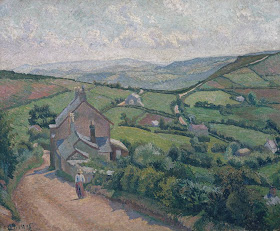The vicissitudes of this world are like the movements of the clouds.
Fifty years of life are nothing but one long dream.
Sparse rain: in my desolate hermitage at night,
Quietly I clutch my robe and lean against the empty window.
Ryokan (translated by John Stevens), One Robe, One Bowl: The Zen Poetry of Ryokan (1977).
Dreams
The farmers are walking about
in their soggy fields. Inside their heads
a pleasant sun shines on crops without weeds.
In a house across the road a young man
plays a piano, aware of Bach and Bartok
listening indulgently to his blundering counterpoint.
And the dog asleep in a doorway twitches
his forepaws. He's chasing
the fattest hare in Midlothian.
Dreams fly everywhere. They creep
into minds whose owners have slammed them shut.
That boy's lungs are full of them.
Sometimes they come true and the world stares
at a new great painting or a body by the wayside
with chopped off hands.
The dreams of sleep dissolve when the window whitens
and the dreams of daylight swarm in with a passport to heaven
in one hand and a passport to hell in the other.
And sweet berries grow over the graves
of all of us or a white stone marks the place
which is the end of dreams, and of hell, and of heaven.
Ewen McCaig (editor), The Poems of Norman MacCaig (Polygon 2009).
Lucien Pissarro, "High View, Fishpond" (1915)


Two excellent poems (and paintings), with fascinating contrasts.
ReplyDeleteRyokan, awake at a time he should be dreaming, realizes life itself is a dream, seeming to pull away the veil as he gathers his robe, but he never tells us what he sees in the empty window frame, the reality or the dream, or if it matters. Similarly, what’s in his mind, what details led him to his insight, are characteristically for Eastern poetry seen as insignificant compared to the way he now looks at things.
MacCaig relishes the details, as he sees nocturnal dreaming in all of daylight’s glories, lucidly identifying it in all we do, as the stuff of our lives, the substance of heaven and hell. He fills in the particulars of the dream quite nicely, but in his Scottish sense of certainty at the end he stops short of a Zen “life is a dream” notion, which leaves open how far the dream goes.
Leaving me wondering if they are really talking about the same thing at all.
Mr. Sigler: as always, thank you for stopping by, and for your thoughts.
ReplyDeleteI agree: I think that MacCaig is speaking of dreams as hopes and fancies, whereas Ryokan is speaking of our unconscious dreamworld, which may in fact be no different than our conscious dreamworld.
Thanks again.
Dear Stephen,
ReplyDeleteThank you for this latest post and, again, your wonderful choice of images ...
Aren't we all poets when we dream?
Certainly in my work as a psychotherapist, I'm often startled and awed by the power of the imagination that can so succinctly distill a worry or a concern or an idea and serve it up in a dream ...
Have you come across the world of 'social dreaming' (Gordon Lawrence). It's fascinating - suggesting a way of bringing people together to talk about their dreams and the possible social links and significances of a culture dreaming together. Then there is the whole other world of the Australian aboriginal 'dream time' ...
Perhaps Stephen, your blog is a kind of 'dream time' for those of us following it!
Greetings from a soggy London.
Eamonn
Eamonn: thank you very much for visiting again, and for your always thought-provoking observations.
ReplyDeleteI hadn't heard of "social dreaming" or of Gordon Lawrence. Based upon some quick research on the Internet, it looks very interesting.
I cannot claim to be a creator of "dream time"! (But I appreciate your kind words.) However, my goal from the outset has been to share my enthusiasms in the hope that others either already share them, or may be coming across them for the first time.
To the extent that a poem (or even a stray line or image) has lodged itself in someone's mind or found its way into someone's dreams, I would be delighted (and flattered and humbled) to think that I may have had a tiny part in bringing that about.
Of course, the most important goal is to make certain that this poetry floats around somewhere out there, by hook or crook. And it is lovely to think that it may find its way into the dreams of all of us.
As ever, thank you for your thoughts.